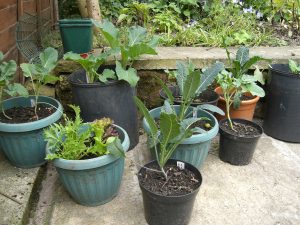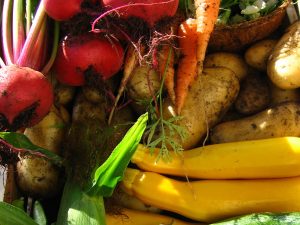With huge changes demanded by the Covid-19 pandemic, community gardens and growing spaces up and down the country are adapting to new realities. Here’s how you can support and get involved in their work to keep communities growing.
At the start of the pandemic, many may have feared that disaster loomed for community-based growing projects. With lockdown and social distancing measures in place, it felt a distant day indeed when volunteers and visitors might be welcomed back. And yet, even in these most difficult of circumstances, remarkable stories of resilience have emerged.
Moving online
With virtual the new normal, many groups were eager still to provide their local communities with a sense of connection and promote local food resilience. Able Community Care in Norfolk teamed up with Social Farms & Gardens members for an online sunflower growing competition (there’s still time to enter!), while Cynon Valley Organic Adventures in Wales launched a range of accredited online courses to help people continue their learning from home.
Live-streamed videos and virtual meeting-ups abounded, many featuring in the excellent #GrowTogether campaign from Social Farms & Gardens, encouraging those of us able to grow our own food from our windowsills, balconies and gardens to give it a try.
On the ground
Others were able to remain open, supplying vital food and other products in their local area in the face of extraordinary demand. One such place was Sutton Community Farm, who have implemented stringent measures to ensure the safety of staff and volunteers alike, as have OrganicLea, a workers’ co-operative supplying veg boxes on the edge of north east London. Larger-scale events, such as their regular open days, have inevitably been cancelled, however.
Also still serving communities has been the Incredible Edible network, offering free seeds, plants and produce to households in Ludlow, Ramsbottom, Wakefield and many more towns and cities across the UK in recent months. Local lockdown restrictions permitting, many groups are back in action with new safety measures for volunteer days in the great outdoors.
“When the going gets tough, the tough get growing! In these times we are more committed than ever to supporting our communities to access and grow organic food.”
OrganicLea, Lea Valley
Looking forward
Although uncertainty still abounds, community gardens are cautiously re-opening, including Rainbow Community Garden in Hull, who are prioritising isolated and vulnerable volunteers, with a host of social distancing and numerous other measures in place. For those in need of guidance, Social Farms & Gardens have pulled together a comprehensive set of Covid-19 resources for spaces set to open their gates. They’re also offering a series of free webinars, with links available to watch those you might have missed.
If you’re keen to get involved with growing in your local community but are unsure where to begin, a good starting place is the Incredible Edible directory. Can’t find a group near you? They also have a guide to starting your own. Also on hand is another great set of resources from Social Farm & Gardens, with tailored information about setting up a community growing space in England, Wales or Scotland.
If you’re not able to join efforts on the ground, there are plenty of other ways you can support your local community growing spaces too, from buying their produce to raising awareness of their work among family and friends. You could also consider growing your own from home in the meantime, too: here’s our introduction to small-space growing to help you.
Last but not least, we couldn’t end a post about community and growing without mentioning our friends at WWOOF UK. WWOOFing is a fantastic way to dip your toe into the realities of life as an organic grower and their team will be posting further updates about day-long socially distanced WWOOFing opportunities soon – watch this space!
Have you recently become involved in a community growing project? We’d love to hear about your experiences in a comment below.
Image by Sludge G via Flickr (CC BY-SA 2.0).
 About the author
About the author
Sophie Paterson is a co-director at Lowimpact.org and NonCorporate.org, where she looks after promotion, social media, the blogs and more. A graduate of the School of Natural Building, she lives in Totnes, Devon, having previously spent a year living and volunteering at a nearby smallholding.










4 Comments
This wonderful I only grow at home but our son, daughter in law and granddaughter live in housing association flats with a lot of grass around it, I have mentioned that perhaps he and some of the other flats tenants might like to start a community garden, I think this would also save on the councils grass cutting bill as well, although that would worry me as it might put people out of work. I don’t know how interested he is but he has tried to grow his own once before and then lost interest again. I would be delighted to help them if they wished it although I tend to garden by the seat of my pants, don’t like manicured gardens nice as they look but you can have pretty gardens and feed yourselves as well. I will pass on this information to him might get him galvanised he is on break from University it might give him the incentive to do something our granddaughter has a small garden in a box we bought her so hoping this might interest her as well. We need younger generations to get stuck in as well. Obviously with next wave of Covid heading our way big gathering of people are not really advisable but a leaflet drop to the flats there are two blocks and of course contacting the council and housing association is an important move if people are interested, I am going to see if we can get our street interested to. would it be alright for me to print this article off and post it through thier letterboxes my last attempt wasn’t very successful but covid has happened since and they might have changed thier minds . This has really cheered me up and got my thought processes ticking over again. Thanks.
At Stonehill Community Gardens we received about £500 from the Tesco bag fund (ie the 5ps collected for use of carriers) that pays us to deliver veggie bags; spuds, beetroot,carrots, courgettes, calabrese, cabbage, cauliflower, onions, cucumbers and now tomatoes (using recycled Tesco bags used for home deliveries!) to ten village households who have appreciated help during the lockdown and now into the probationary period. We hope to develop deeper relationships with some of these households.
@annbeirneanimalwhisperert Thanks commenting, Ann – it’s great to know it cheered you up and might be of interest and help to your family too. Please absolutely feel free to share and I hope it will bear fruit. Do let us know how things go.
@DanielScharf It’s lovely to hear about your funding and the great use it was put to these last months. I do hope you’ll be able to find ways to maintain the relationships you’ve been building. I had a peek at your website just now and it looks like a fantastic set-up. How long has it been running?